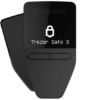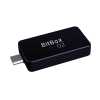Hardware Wallet Comparison
Please select the hardware wallets you would like to compare. You can select and compare up to five hardware wallets. You can use the search field in the drop-down menus to quickly find the model you want.
| 1 | 2 | 3 | 4 | 5 | |
|---|---|---|---|---|---|

|

|

|

|

|
|
| Model | Trezor Safe 3 | Ledger Nano S Plus | BitBox02 | Tangem Wallet | ELLIPAL Titan 2.0 |
| Test Result |
|
|
|
|
|
| Brand | Trezor | Ledger | SHIFT Crypto | Tangem | ELLIPAL |
| Platform | Windows, Android, Linux, Mac | Windows, Linux, Mac, Android, Chrome OS | Windows, Linux, Mac, Android | Android, iOS | Android, iOS |
| Altcoin Support | |||||
| Supported Coins | 9.000+ (to the complete list) | 5.500+ (to the complete list) | 1.500+ (to the complete list) | 1.000+ (to the complete list) | 10.000+ (to the complete list) |
| Open Source | |||||
| Secure Element | |||||
| Display as 2FA | |||||
| Interfaces | USB | USB | USB, microSD | NFC | microSD, Camera |
| Input Options | Buttons | Buttons | Touch Buttons | - | Touchscreen |
| Weight | 14g | 21g | 12g | 6g | 138g |
| Size | 59x32x7.4mm | 62.39x17.40x8.24mm | 54.5x25.4x9.6mm | 85.6 x 54 x 1mm | 118x66x9.7mm |
| Reviewto the shop | Reviewto the shop | Reviewto the shop | Reviewto the shop | Reviewto the shop |
Hardware wallet comparison: what you should know
Do you want to store your cryptocurrencies securely and are looking for a suitable solution? Then you’ve come to the right place. In this article, you will find out what a hardware wallet is, what advantages it offers and what you should look out for when comparing different models. Everything is clearly laid out in a tabular hardware wallet comparison, where you can compare up to five devices individually.
What is a hardware wallet?
A hardware wallet is a special device that stores your private keys for your cryptocurrencies offline. This means that you protect your coins from hacker attacks, viruses and other dangers that could threaten your online wallets. A hardware wallet is like a safe for your digital assets.
A hardware wallet is usually equipped with a USB port, a display and a few buttons. To confirm a transaction, you must connect the hardware wallet to your computer or smartphone and enter a PIN. You can then check the details of the transaction on the display and confirm or reject it using the buttons. This gives you full control over your cryptocurrencies and prevents errors or fraud.
What are the advantages of a hardware wallet?

Hardware wallet comparison
A hardware wallet offers you several advantages over other wallet types, such as
- Security: Since your private keys never leave the device, they are protected against online attacks. A hardware wallet also has various security mechanisms, such as a PIN, a passphrase or a recovery seed, which prevent anyone else from accessing your coins, even if they get their hands on the hardware wallet.
- Compatibility: A hardware wallet is usually compatible with several cryptocurrencies, so you don’t need a separate wallet for each coin. You can also connect your hardware wallet to various software wallets to access different functions and services, such as buying or selling coins, staking or DeFi.
- Ease of use: A hardware wallet is easy to use and manage. All you have to do is set up the device, transfer your coins to it and confirm your transactions. You don’t have to worry about updates, backups or passwords, as everything is stored on the hardware wallet.
What should you look out for when comparing hardware wallets?
If you want to buy a hardware wallet, you should consider a few factors when comparing different models, such as:
- Price: A hardware wallet is an investment in your security, but also in your convenience. You should therefore choose a device that suits your budget and your needs. A hardware wallet can cost between 50 and 200 euros, depending on the brand, quality and functions.
- Design: A hardware wallet should be robust, compact and lightweight so that you can transport and store it easily. The display should also be clear and legible so that you can easily check your transactions. The buttons should also be easy to reach and responsive so that you can confirm your transactions quickly and securely.
- Functions: A hardware wallet should offer you all the functions you need for your cryptocurrencies. This includes support for different coins, integration with different software wallets, the ability to buy, sell, swap, stake or borrow your coins, and customization of your security settings. You should therefore choose a hardware wallet that meets your requirements and preferences.
Conclusion
A hardware wallet is one of the most secure and convenient ways to store your cryptocurrencies. It protects your private keys from online attacks, gives you full control over your transactions and gives you access to various functions and services. If you want to buy a hardware wallet, you should compare different models and pay attention to the price, design and functions. How to find the best hardware wallet for you. This hardware wallet comparison can also help you in your search.